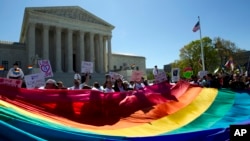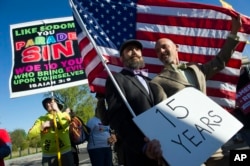Lawyers for and against same-sex marriage faced off before the Supreme Court Tuesday, as the nine justices grappled with what many see as a generational-defining social question in the United States.
Though the high court is only hearing oral arguments and won't issue any ruling before June at the earliest, thousands of supporters and opponents of the issue rallied outside the courthouse, turning the sidewalks into a riot of color, music, preaching, chanting and flag-waving.
Polls in recent years have shown a sea change among Americans in support of same-sex marriage, but the U.S. political system has resulted in patchwork of laws for gay couples.
With lower federal courts issuing conflicting opinions, the Supreme Court in January accepted a compilation of cases, signaling an intention to clarify a question that was unthinkable a generation ago.
Do gay and lesbian couples have the same constitutional right to marry as opposite-sex couples do?
Factbox: Supreme Court - Same-Sex Marriage
On Tuesday, lawyers will argue:
1) Must states allow same-sex couples to marry?
2) Must states recognize same-sex marriages performed in other states?
WHY THE SUPREME COURT IS INVOLVED
Marriage laws are primarily the responsibility of individual states, but there have been contradictory rulings among federal appeals courts, prompting the Supreme Court to step in and make a final ruling.
WHAT’S THE CURRENT STATE OF LAW?
Same-sex marriage is currently legal in 36 states and Washington, DC, resulting from voter initiatives, legislative action or court rulings.
WHAT’S AT STAKE:
If the court rules in favor of same-sex marriage, it will likely become the law of the land nationwide, making gay and lesbian married couples eligible for hundreds of benefits, rights and protections regardless of the state in which they live.
Angelia Frazier-Henson, a 35-year-old social worker, traveled to Washington, D.C., with her partner Kathy from their home in Benton, Arkansas. The two were married in Arkansas in May last year during a brief window before a state judge suspended same-sex marriage there.
For them, the question is as much practical as anything, Frazier-Henson said. When they file their Arkansas taxes, they're required to use the same filing status as they use for federal taxes. But she said, under federal law, they're a married couple, whereas under state law, they're not.
"That means we're committing perjury no matter how we file our (state) taxes," she said.
"What happens in our bedroom is just as important to what happens in a heteorsexual couples's bedroom," she said.
WATCH: Same-sex marriage supporters Angelia and Kathy
The din on the sidewalks Tuesday was a mashup of preachers condemning homosexuality as sinful, and elected officials proclaiming support for traditional marriage, as same-sex activists booed and jeered.
People held signs reading "Love is What Makes a Family" and "I Was Queer and Then I Found Jesus."
A group calling itself the Gay Men's Chorus sang the traditional gospel song "We Shall Over Come" and the national anthem. Steps away, a group of Jewish same-sex marriage supporters sang Hebrew songs, while Orthodox Jewish men holding banners reading "Destroying Religious Freedom Is Not a Right; It's Persecution," chanted back "You're Not Jews!"
Same-sex marriage "is a threat to our religion, to our people, to our future," said Rabbi Dovid Feldman, of Muncie, New York, who led the group of Jewish men protesting on a street corner. "This is a violation of God's rule, which is an issue that should concern every God-fearing person."
At the heart of the hearing Tuesday are same-sex couples who are now barred from civil marriage in their home states, including Jayne Rowse and April DeBoer.
The couple is raising four adopted children and a foster child near Detroit, Michigan, which is one of a dwindling number of states where same-sex couples cannot legally wed.
Currently, same-sex marriage is legal in 36 states and Washington D.C., made so by either voter initiatives, court rulings or legislative action.
Two years ago, the high court by a 5-4 vote overturned a 1996 law that barred the federal government from recognizing same-sex marriages for the purposes of federal benefits, like tax and inheritance laws.
That ruling, United States v. Windsor, paved the way for Tuesday’s hearing, which focuses on four separates cases challenging bans on same-sex marriage in Michigan, as well as in Kentucky, Ohio and Tennessee.
For DeBoer and Rowse, despite sharing a home and bearing shared responsibility for five young children, the state of Michigan treats them as two single, cohabitating adults.
That status not only denigrates their relationship, DeBoer said, but it places them at a legal disadvantage should an emergency arise: a hospital could theoretically bar one parent from seeing the other’s parents legally adopted child.
“We spend family time together. We teach the kids to do chores. We teach the kids to ride bikes,” she said. “You know, there's no difference in our family. The only difference is, is who, who we love and that shouldn't be a reason to not treat us the same and not give us the same legal rights as everybody else.”
John Bursch, a lawyer who was scheduled to argue in defense of the 11-year-old, voter-approved Michigan Marriage Amendment, said the question of marriage equality should be made by voters.
"Marriage is one of those things where people can have different opinions and it has to be decided at the ballot box and not through the courts," Bursch told the Detroit News in an interview last week. "It's about who gets to decide not what should be decided."
Some legal scholars believe the Supreme Court already has telegraphed its ultimate intention, and will rule in favor of same-sex marriage, though it’s unclear how narrow that ruling will be.
“I think the writing is on the wall,” said Nan Hunter, a Georgetown University law professor. “I think almost everyone believes that it is just a matter of time before gay couples can marry anywhere in the United States.”
“We have now absurd situations in which a [gay] couple marries in one state legally. They move to another state where it isn’t legal, not married for state law purposes even though they are for federal purposes,” Hunter said.
WATCH: Same-sex marriage opponent














